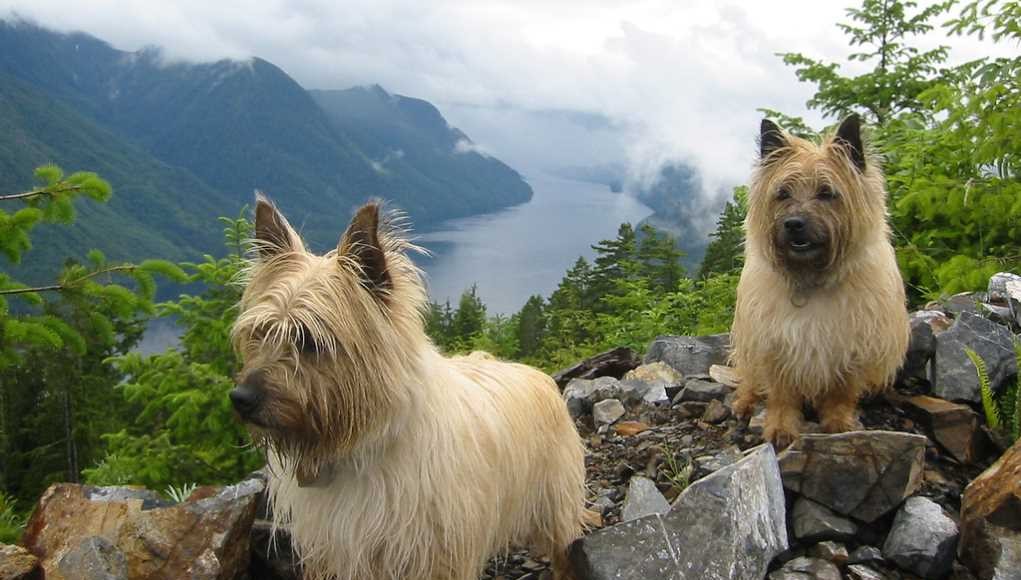Table of Contents
Camping is one of the best vacations you can take to get away from the hustle and bustle of everyday life. You will get in touch with nature by spending your time swimming, hiking, and sitting around the campfire with family or friends as the outdoors tests your mettle. Like Yvonne Prinz said..
“If you can survive camping with someone, you should marry them on the way home.”
And if there's one companion you should consider bringing on a camping trip – it's your loyal Fido.
Dogs are usually great campers because they’re enthusiastic and not often deterred from doing anything outdoors that involves physical activity. If your family and friends aren’t exactly the camping type, your dog will certainly be up for the challenge! However, even though dogs are animals that used to live in the wild, there are some things that responsible pet parents should consider and actually prepare the dog for camping by following a few simple guidelines below.

Safety needs to be your first concern while camping, not only for your dog but for yourself as well. You'll also need to be sure you have all the must-have pet supplies you'll need because chances are you won't be very close to a pet store while camping with a dog.
Once you complete these precautionary measures, you can begin your adventure knowing you are properly prepared.
How to Prepare Your Dog For Camping
First thing first: take him to the vet. Camping isn’t always easy, especially if there is inclement weather or bugs. The veterinarian should give your dog a clean bill of health before you go camping together. If your canine is old or has health problems, the vet will make a professional, informed decision as to whether or not camping would be a good idea or a dangerous one.
At the vet, get your dog immunized. There are a lot of bacteria out there in the wilderness. Running into a rabid animal is also a possibility, albeit an unlikely one. Getting your dog’s vaccines and inoculations up to date will ensure that he isn’t susceptible to diseases like heartworm or rabies.
RELATED: Hiking With a Dog? Here's What You Need to Know
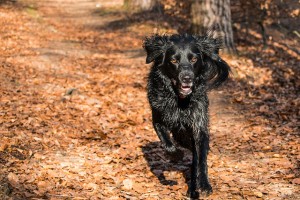
Making sure your dog is identifiable is also imperative. If, in the worst-case scenario, your dog sees a squirrel or a rabbit and goes running off, locating him will be much easier if you have some sort of identification measures in place. This can take the form of an ID tag with your dog’s name and all your contact information on it, or you can also use a microchip or GPS tracker.
A microchip is a tiny implant that is minimally invasive, whereas a GPS is a device that attaches to your dog’s collar. Both are resoundingly good ideas to look into if you have an energetic dog with a short attention span and you believe he is a runaway risk.
Along with identification in the form of a nametag, bring your dog’s papers. You can never be over-prepared as a pet owner, and if you’re staying at a campground, you will probably have to show that your dog is registered and up-to-date on all his shots. Put all of the dog’s veterinary certificates and necessary paperwork in one folder and keep that with you in a safe location. It's also a good idea to keep them in a plastic zippered storage bag so they don't get wet or ruined while traveling.
Be sure to have the proper medical supplies on hand
Whether it’s humans or dogs camping, being medically prepared is vital. Don’t forget any of your or your dog's medication. This includes both emergency (coated Aspirin) and non-emergency medications. If your dog is supposed to be taking any prescription drugs, make sure to bring them too (have more than enough to last for the entire trip).
RELATED: How to put together your own first aid kit for dogs?
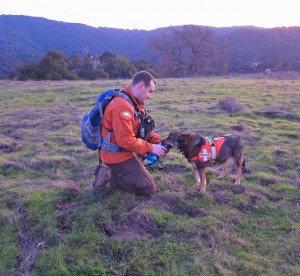
First aid kits are a must. In addition to the dirt, mud, and animals, there’s always a chance that your dog might suffer some kind of injury while playing in the wild.
Your Fido's first aid kit should include dog-specific items such as coated aspirin, pet wrap, styptic powder, ear and eye drops, first aid gel for pets, and paw balm in case the weather gets cold. You can purchase pet first aid kits at most pet stores or put together your own first aid kit for dogs based on our guidelines (link above), which is cheaper and better.
TIP: If you have everything you need at home, you can save money by packing those dog health supplies into a small bag and making your own DIY canine first aid kit.
Dogs and humans don’t always use the same first aid products, so it is important to make sure that everything you bring is dog-safe. Take precautionary measures and apply flea and tick medication before you leave. Nothing ruins a camping trip faster than the dog tracking in ticks and fleas and spreading them to everyone else.
Applying a preventative spray or cream to your dog in order to keep ticks and fleas away should be absolutely mandatory, not only when you’re going camping, but also when taking your dog to do any outdoor activity whatsoever.
Things you'll need to pack to prepare your dog for camping
For the packing list in general, be sure to think it through and check the list multiple times. Bring leashes and tethers. If you don’t want to risk the chance of your dog running off while on a hike, use a leash to keep your pooch near you. Keep it long so that your dog has a chance to explore whatever is around him.
Using a tethering rope and stick is also a good idea when you go anywhere around the campsite without your dog. The alternative is leaving your pet in the tent or a dog crate, and that’s no fun for a dog who likes fresh air and simply wants to be outside, running “young, wild, and free.”
RELATED: Tips for Traveling with Your Dog
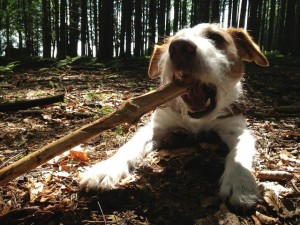
Don't just focus on things to keep your Fido reined in when you're preparing to go camping with your pooch. Bring the fun stuff, too!
Camping is a vacation for your pup, too; it’s your dog’s chance to run around and play until he’s exhausted! Bring plenty of awesome dog toys and games for your dog. Not only will he enjoy it, but you will have a great time as well. Dogs have a lot of natural energy and get bored quickly, so having a variety of toys will keep both of you from driving each other crazy.
Bath supplies are another great thing to add to your list. Dogs, being dogs, will always find a way to get as messy as possible. Rather than leaving your dog dirty if they accidentally get into some mud, bring his or her bath stuff from home just in case you need it (and you probably will). You also never know what's in the woods around you, and dogs have a tendency to find stinking things to roll in.
Once nighttime rolls around, you'll need to make sure your dog is warm and comfortable. It’s okay not to have your dog sleep right next to you on your blow-up bed or sleeping bag, but wherever you choose to house him, make sure that he has somewhere to go to get out of the elements and that he's safe from any predators that may be lurking in the woods.
Even during a hot day, it can end up being chilly at night, and you wouldn’t want your dog to get sick or be uncomfortable. Even though it's not a necessity, you can still bring some dog bedding for your pooch: blankets, mats, a pillow, or maybe even a dog bed to keep him up off the cool ground.
Don't forget about the simple things.
You may think it's not worth mentioning, but the everyday pet products that your dog uses should be on your list, too. I know it seems silly, but when you have a lot of things to remember, the ones that make the most sense to take with you tend to slip your mind. Be sure to bring any of the following dog supplies that your canine uses regularly:
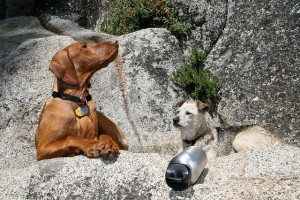
- Dog food
- Bowls
- Bottles of fresh water (for the dog)
- Kennel/Crate
- Poop Bags/Pooper Scooper
- A towel to dry your dog
- Brush
- Jacket
- Bedding
- Boots (maybe?)
Even though your dog is on vacation, don't let him run wild
Another tip that bears mentioning is proper pet etiquette. Just because you're on a vacation with your pet doesn't mean you can just let him run wild. Whether you're at a campground or in the middle of the woods, your dog still needs to behave as well as he would at home.
This should go without saying, but make sure to keep your dog content and not bark all the time. If you're around other campers, it will disturb them, and if you think you're alone in the woods, you may not be. Your Fido's barking will also “upset” the natural wildlife in the woods around you.
RELATED: 18 Best USA Hotels That Allow Dogs
Remember to clean up after your dog and supervise him at all times when he is around other people or pets.
If your dog doesn’t do well around unfamiliar people and you're going to a campground that will be populated by strangers, you may want to reconsider taking him on the trip with you. U.S. Forest Service has prepared a good PDF handbook that any dog parent should glance through before taking their pets camping with them, and the American Kennel Club has a few more tips on safety and precautions as well.
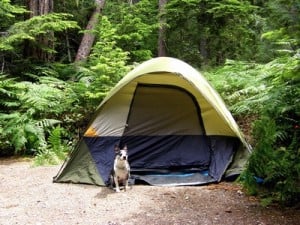
The same is true if your pooch is not comfortable around strange animals. Chances are there will be many other dogs running around if you're going to some of the more popular camping areas.
If you take these tips into account without setting off to travel with your dog, you’ll be sure to have a great camping experience together. Camping can be a blast, especially with a canine companion that’s willing to go outside and hike with you. As long as you keep your dog healthy and happy, camping with him will be a successful and rewarding experience. If your dog is well-behaved, friendly, and non-aggressive when he meets other animals or people, the trip should go off without a hitch.


